外研版(2019)选择性必修 第三册Unit 5 Learning from nature Developing ideas Reading课件(共35张PPT,内镶嵌2视频)
文档属性
| 名称 | 外研版(2019)选择性必修 第三册Unit 5 Learning from nature Developing ideas Reading课件(共35张PPT,内镶嵌2视频) | 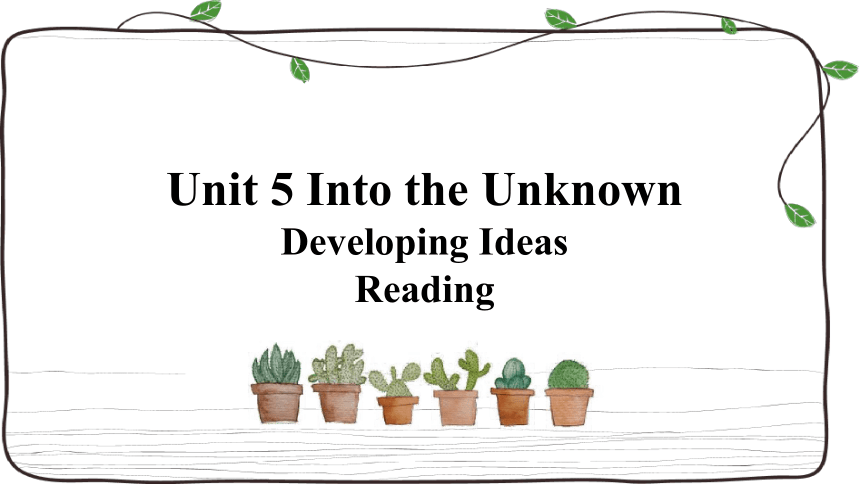 | |
| 格式 | pptx | ||
| 文件大小 | 135.8MB | ||
| 资源类型 | 教案 | ||
| 版本资源 | 外研版(2019) | ||
| 科目 | 英语 | ||
| 更新时间 | 2025-04-27 15:05:15 | ||
图片预览


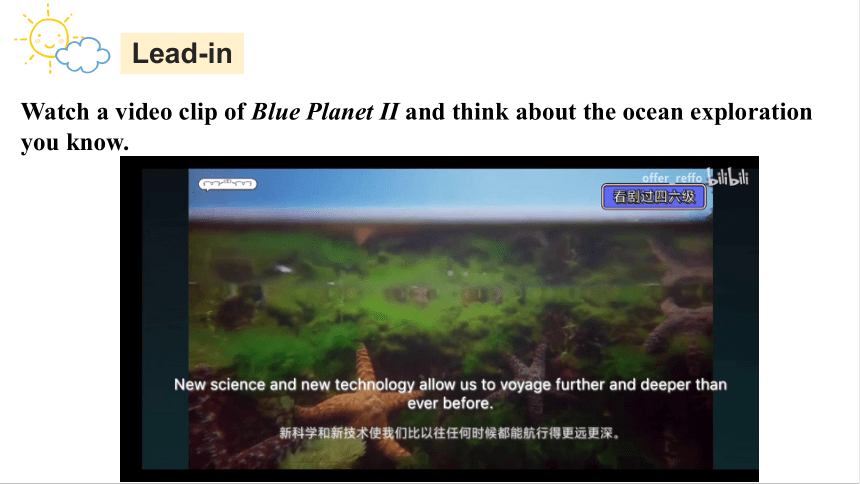

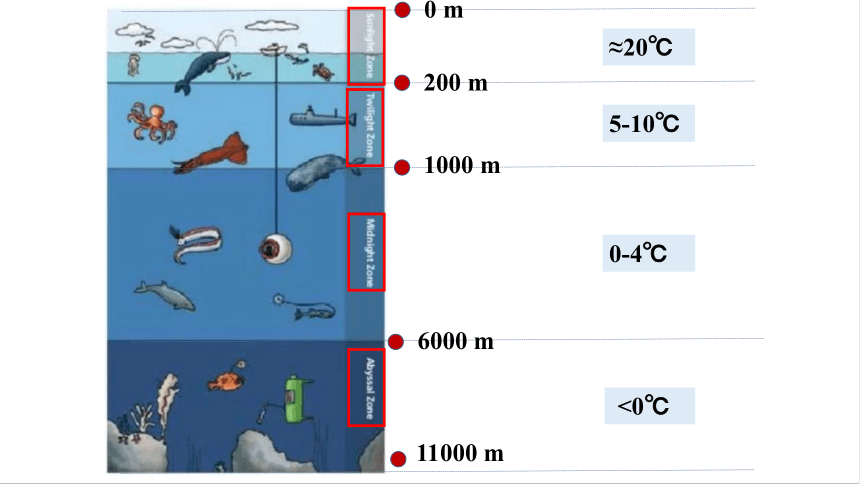
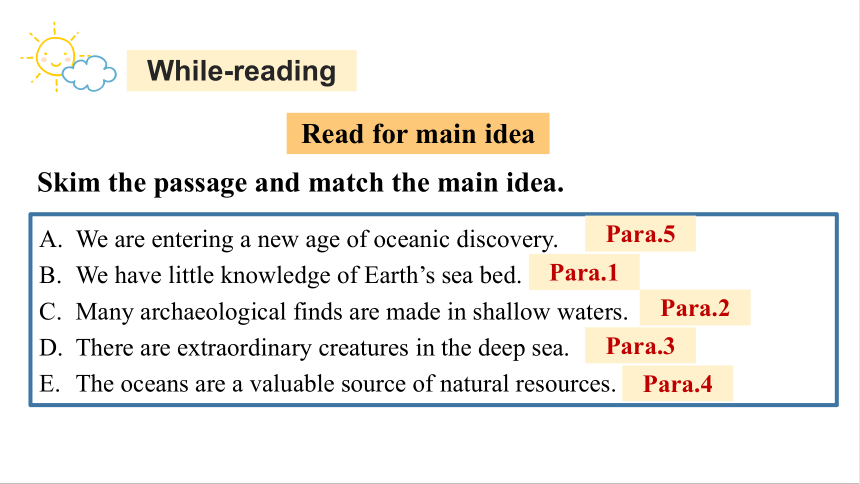
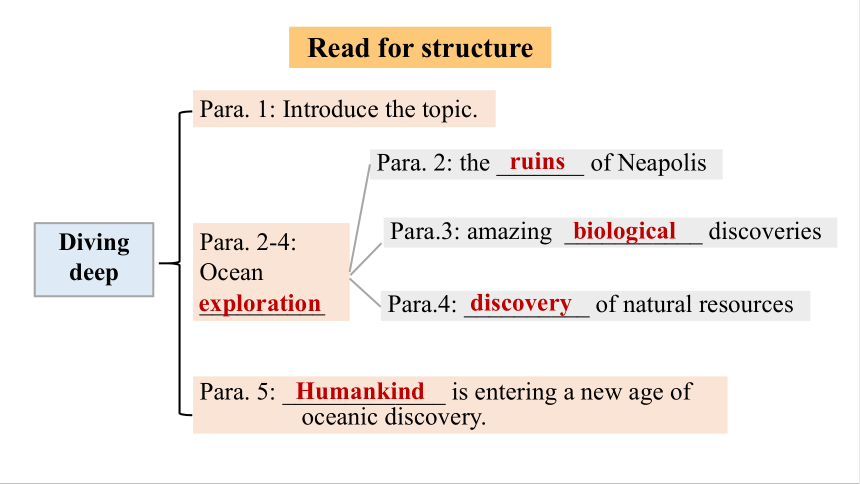
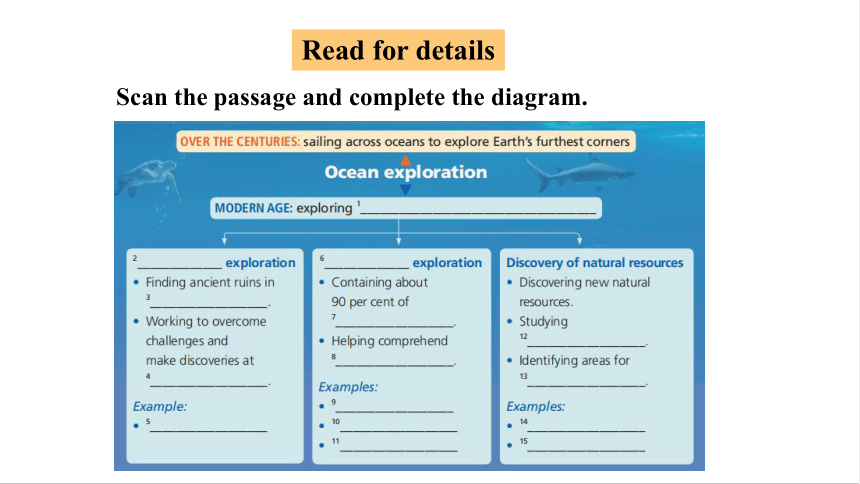
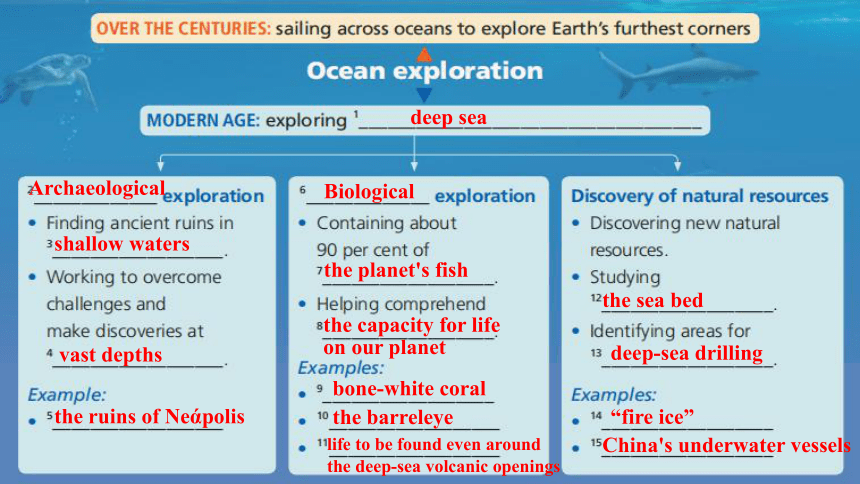

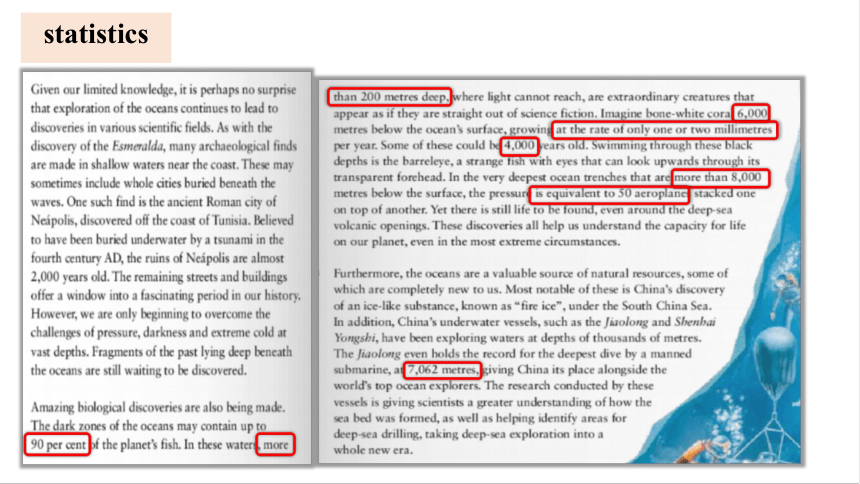
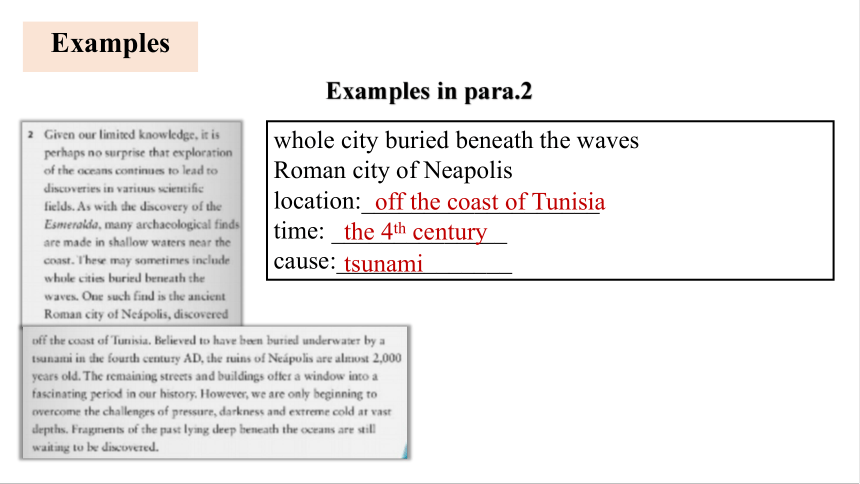
文档简介
(共35张PPT)
Unit 5 Into the Unknown
Developing Ideas
Reading
Learning objective
To know the history of sea exploration, discoveries by reading the passage
Watch a video clip of Blue Planet II and think about the ocean exploration you know.
Lead-in
Look at the picture and answer the questions. Do further research if necessary.
What different zones are there in the ocean
Which parts of the ocean do you think have been explored
What do you know about the deepest part of the ocean
The different zones in the ocean are Sunlight Zone(阳光地带), Twilight Zone(阴影区), Midnight Zone(午夜区) and Abyssal Zone(深海层).
Pre-reading
200 m
1000 m
6000 m
11000 m
0 m
≈20℃
5-10℃
0-4℃
<0℃
We are entering a new age of oceanic discovery.
We have little knowledge of Earth’s sea bed.
Many archaeological finds are made in shallow waters.
There are extraordinary creatures in the deep sea.
The oceans are a valuable source of natural resources.
Read for main idea
Skim the passage and match the main idea.
Para.5
Para.1
Para.2
Para.3
Para.4
While-reading
Diving deep
Para. 1: Introduce the topic.
Para. 2-4:
Ocean
__________
Para. 2: the _______ of Neapolis
Para.3: amazing ___________ discoveries
Para. 5: _____________ is entering a new age of oceanic discovery.
Humankind
ruins
Para.4: __________ of natural resources
biological
discovery
exploration
Read for structure
Read for details
Scan the passage and complete the diagram.
deep sea
Archaeological
shallow waters
vast depths
the ruins of Ne polis
Biological
the planet's fish
the capacity for life on our planet
bone-white coral
the barreleye
life to be found even around the deep-sea volcanic openings
the sea bed
deep-sea drilling
“fire ice”
China's underwater vessels
Read for writing skills
What writing skills are used in the passage
Statistics & examples
The discourse markers(语篇标记)
statistics
Examples
Examples in para.2
whole city buried beneath the waves
Roman city of Neapolis
location:___________________
time: ______________
cause:______________
off the coast of Tunisia
tsunami
the 4th century
Examples
Examples in para.3
200 metres
dark zone
6000 metres deep
8000 metres
Name:_____________
Age: _____________
Name:_____________
Features: _____________
barreleye
transparent head
Eyes can look upwards
life to be found even around the deep sea vocalnic openings
bone-white coral
4000 years old
Examples
Examples in para.4
China’s achievements:
New natural resource: __________
Underwater vessels: ___________________________
fire ice
Jiaolong & Shenhai Yongshi
Tip: The use of statistics and examples make the passage more convincing.
discourse markers
Tip: These markers function like road signs, helping you connect ideas and understand the writer's attitude and opinions. (P77)
Think & Share
What common message do the two reading passages in this unit convey How do they each build upon this idea
Both passages convey the message that humans have the desire and means to explore the unknown.
The first passage does this by looking at our fascination with history’s greatest mysteries, while the second passage looks at pioneering exploration of Earth's oceans.
Post-reading
Group work
Watch the video clip of program Tides of Change and finish the following task.
Group work
“Creating a better livelihood” is shown in the video clip, which is also one of the purposes of China’s ocean exploration. Please introduce the influence of ocean exploration on people’s daily life for the audience according to the diagram below.(P77)
The air we breathe: The ocean produces over half of the world’s oxygen and absorbs 50 times more carbon dioxide than our atmosphere.
Climate regulation: Covering 70 percent of the Earth’s surface, the ocean transports heat from the equator to the poles, regulating our climate and weather patterns.
Food: The ocean provides more than just seafood; ingredients from the sea are found in surprising foods such as peanut butter and soymilk.
Medicine: Many medicinal products come from the ocean, including ingredients that help fight cancer, arthritis, Alzheimer’s disease, and heart disease.
Recreation: From fishing to boating to kayaking and whale watching, the ocean provides us with many unique activities.
1. Lying under waters across the globe are an estimated three million shipwrecks. All of them represent attempts over the centuries to explore Earth's furthest corners. Among these is the Esmeralda, the earliest wreck from the age of the European exploration of Asia. Today, some 500 years after the Esmeralda set sail, there is lttle - if any - land on our planet left unexplored. We have more detailed maps of the Moon, and even of Venus and Mars, than we do of Earth's own sea bed.
全球水域下大约沉睡着三百万艘沉船残骸,每艘都代表了若干世纪以来探索地球最远端的努力尝试。其中就包括了“埃斯梅拉达”号,它是欧洲国家探索亚洲时代留下的最早残骸。如今,距离“埃斯梅拉达”号起航已有500多年,我们星球上尚未被人类探索的土地已经少之又少了。然而,我们手中关于地球自身海底的地图,甚至比不上关于月球乃至金星、火星的天体图详尽。
Language Points
2 Given our limited knowledge, it is perhaps no surprise that exploration of the oceans continues to lead to discoveries in various scientific fields. As with the discovery of the Esmeralda, many archacological finds are made in shallow waters near the coast. These may sometimes include whole cities buried beneath the waves. One such find is the ancient Roman city of Neapolis, discovered off the coast of Tunisia.
基于我们有限的认知,探索海洋可以带来许多科学领域的新发现,这也许就显得不足为奇了。就像发现“埃斯梅拉达”号的残骸一样,很多考古学发现都发生在近海岸的浅水水域。这些发现有时会包括埋在海浪下的整座城市,其中之一便是在突尼斯近海发现的古罗马城市奈阿波利斯。
2 Believed to have been buried underwater by a tsunami in the fourth century AD, the ruins of Naipolis are almost 2,000 years old. The remaining streets and buildings offer a window into a fascinating period in our history. However, we are only beginning to overcome the challenges of pressure, darkness and extreme cold at vast depths. Fragments of the past lying deep beneath the oceans are still waiting to be discovered.
据悉,在公元4世纪,奈阿波利斯被-场海啸淹没,其废墟至今已有近2,000年的历史。存留下来的街道、建筑为我们打开了一扇窗,让我们得以窥见那段精彩的历史。然而,我们才刚刚开始克服广袤的海洋深处的压强、黑暗和极寒所带来的挑战。过去的碎片仍深藏在大洋底部,等待被发现。
3. Amazing biological discoveries are also being made.The dark zones of the oceans may contain up to 90 per cent of the planet's fish. In these waters, more than 200 metres deep, where light cannot reach, are extraordinary creatures that appear as if they are straight out of science fiction. Imagine bone white coral 6,000 metres below the ocean's surface, growing at the rate of only one or two millimetres per year. Some of these could be 4,000 years old.
生物学领域也有惊人的发现。海洋的黑暗区域里或许生存着多达地球上90%的鱼类。在200多米以下、阳光照不到的深水水域里,住着一些看 起来就像是刚从科幻小说中走出来的奇异的生物。想象一下,在海平面下6,000米深处,骨白色的珊瑚以每年仅一到两毫米的速度缓慢生长着,它们中有些已经存活了4,000年。
4 Furthermore, the oceans are a valuable source of natural resources, some of which are completely new to us. Most notable of these is China's discovery of an ice-like substance, known as“fire ice", under the South China Sea. In addition, China's underwater vessels, such as the Jiaolong and Sbenhai Yonrgsbi, have been exploring waters at depths of thousands of metres.
此外,海洋还包含着珍贵的自然资源,其中一些对我们来说完全是新的资源。最值得一提的便是中国在南海发现的冰状物质一一可燃冰。此外,中国的水下舰艇如“蛟龙”号和“深海勇士”号,一直在数千米深的水域探索。
4 The Jiaolong even holds the record for the deepest dive by a manned submarine, at 7,062 metres, giving China its place alongside the world's top ocean explorers. The research conducted by these vessels is giving scientists a greater understanding of how the sea bed was formed, as well as helping identify areas for deep -sea drilling, taking deep sea exploration into a whole new era.
“蛟龙”号甚至创造了载人潜舰的最深下潜纪录7 ,062米,使中国跻身于世界顶级海洋探索国之列。借助这些潜水器所完成的研究有利于科学家进一步了解海床的形成过程,帮助确定深海钻探区域,将深海勘探带入一个崭新的时代。
5 Being a tough environment of complete darkness, enormous pressure and intense cold, the ocean depths have long been beyond the reach of human exploration. However, through dloser international scientific, economic and cultural cooperation, we are all becoming part of a global mission to open up our planet's final fronter. Humankind is entering a new age of oceanic discovery, and the world beneath the waves may one day be almost as familiar to us as the land we walk upon today.
深海区域环境恶劣,完全黑暗、压强极大、极度寒冷,长期以来都是人类探索无法企及的区域。然而,通过更紧密的国际科学、经济以及文化合作,我们都在成为开拓地球最后疆域这一全球使命的参与者。人类正走向海洋发现的新时代,或许有朝一日,我们会像熟悉脚下的土地一样熟悉那海浪下的世界。
Today, some 500 years after the Esmeralda set sail, there is little— if any —land on our planet left unexplored.
句意:今天,在“埃斯梅拉达”号起航约500年后,我们的星球上几乎没有未被探索过的陆地。
1
Do you like collecting things If so, what
你喜欢收集东西吗?如果喜欢的话,你喜欢收集什么?
If possible keep a spare pair of glasses accessible in case your main pair is broken or lost.
如果有可能的话,最好准备一副备用眼镜,以防常用的那副眼镜被打碎或丢失。
The scholar seldom, if ever, goes to the opera.
这个学者很少去看歌剧。
________(如果这样的话), you have to suffer from great pressure.
____________(如果有必要), he will design another new advertisement.
本句中 if any 为一种省略形式,补充完整是 if there is any表示“如果有的话”。
某些句式经过长期发展已成为固定搭配:
if possible 如果可能的话
if only 要是……就好了
if ever 如果有过的话
if not 如果不的话
What if... 如果……怎么办?
Why not 为什么不呢?
What for 为什么?
when/where necessary 必要的时候/地方
If so
If necessary
Given our limited knowledge, it is perhaps no surprise that exploration of the oceans continues to lead to discoveries in various scientific fields.
句意:考虑到我们有限的知识,对海洋的探索继续导致各种科学领域的发现也许并不奇怪。
2
Judging from his accent, he is from Hong Kong.
从口音判断,他来自香港。
Considering your health, you’d better have a rest.
考虑到你的健康,你最好休息一下。
To tell you the truth, I’m not so interested in the religious matter.
跟你说实话,我对这件宗教事情的兴趣不大。
本句为given引导的介词短语作状语,given还可作连词后面跟句子。
英语中常见的独立成分还有:
supposing/assuming/providing/provided (that...) 假如/如果
judging from... 根据……判断
Generally speaking... 一般说来
Frankly speaking... 坦白地说
【语法填空】
________(give) that they’re inexperienced, they’ve done a good job.
___________(assume) that you are chosen to be a volunteer at the Olympic Games, what will you do
________(see) that you have no time, I have Peter replace you.
Frankly _______, I’m not too keen on this meal, either.
Given
Assuming
Seeing
speaking
3. Swimming through these black depths is the barreleye, a strange fish with eyes that can look upwards through its transparent forehead.
句意:在这些黑色的深处游动的是管眼鱼,这是一种奇怪的鱼,它的眼睛可以通过透明的前额向上看。
句子结构分析
that引导定语从句
分词短语引导完全倒装句
4. In the very deepest ocean trenches that are more than 8,000 metres below the surface, the pressure is equivalent to 50 aeroplanes stacked one on top of another.
句意:在海面以下8000多米的最深海沟中,其压力相当于50架飞机叠在一起的压力。
句子结构分析
非谓语动词作定语
that引导的定语从句
Being a tough environment of complete darkness, enormous pressure and intense cold, the ocean depths have long been beyond the reach of human exploration.
句意:海洋深处环境恶劣,一片漆黑,压力巨大,温度极低,长期以来都是人类无法探索的。
5
①The West Lake was beautiful beyond description.
西湖美得难以描述。
②I honour him beyond expression.
我对他佩服得无法表达。
③Our quality is far beyond comparison.
我们的质量是无与伦比的。
beyond one’s reach 够不着
beyond recognition 认不出来,无法辨认
beyond question 毫无疑问的(地),确实的(地)
I find his behaviour _______________.
我发觉他的作为令人难以置信。
The children were _________________.
这些孩子不听管教。
The play was dull __________________.
这出戏沉闷得无法相容。
I feel a sense of satisfaction and gratitude _________________.
我感到说不出的满足和感激。
【选词填空】
beyond control 无法控制,失去控制
beyond one’s power 力所不及
beyond expectation 出乎意料
beyond expression 难以表达
beyond one’s capacity 超出某人能力
beyond belief
beyond control
beyond description
beyond expression
Unit 5 Into the Unknown
Developing Ideas
Reading
Learning objective
To know the history of sea exploration, discoveries by reading the passage
Watch a video clip of Blue Planet II and think about the ocean exploration you know.
Lead-in
Look at the picture and answer the questions. Do further research if necessary.
What different zones are there in the ocean
Which parts of the ocean do you think have been explored
What do you know about the deepest part of the ocean
The different zones in the ocean are Sunlight Zone(阳光地带), Twilight Zone(阴影区), Midnight Zone(午夜区) and Abyssal Zone(深海层).
Pre-reading
200 m
1000 m
6000 m
11000 m
0 m
≈20℃
5-10℃
0-4℃
<0℃
We are entering a new age of oceanic discovery.
We have little knowledge of Earth’s sea bed.
Many archaeological finds are made in shallow waters.
There are extraordinary creatures in the deep sea.
The oceans are a valuable source of natural resources.
Read for main idea
Skim the passage and match the main idea.
Para.5
Para.1
Para.2
Para.3
Para.4
While-reading
Diving deep
Para. 1: Introduce the topic.
Para. 2-4:
Ocean
__________
Para. 2: the _______ of Neapolis
Para.3: amazing ___________ discoveries
Para. 5: _____________ is entering a new age of oceanic discovery.
Humankind
ruins
Para.4: __________ of natural resources
biological
discovery
exploration
Read for structure
Read for details
Scan the passage and complete the diagram.
deep sea
Archaeological
shallow waters
vast depths
the ruins of Ne polis
Biological
the planet's fish
the capacity for life on our planet
bone-white coral
the barreleye
life to be found even around the deep-sea volcanic openings
the sea bed
deep-sea drilling
“fire ice”
China's underwater vessels
Read for writing skills
What writing skills are used in the passage
Statistics & examples
The discourse markers(语篇标记)
statistics
Examples
Examples in para.2
whole city buried beneath the waves
Roman city of Neapolis
location:___________________
time: ______________
cause:______________
off the coast of Tunisia
tsunami
the 4th century
Examples
Examples in para.3
200 metres
dark zone
6000 metres deep
8000 metres
Name:_____________
Age: _____________
Name:_____________
Features: _____________
barreleye
transparent head
Eyes can look upwards
life to be found even around the deep sea vocalnic openings
bone-white coral
4000 years old
Examples
Examples in para.4
China’s achievements:
New natural resource: __________
Underwater vessels: ___________________________
fire ice
Jiaolong & Shenhai Yongshi
Tip: The use of statistics and examples make the passage more convincing.
discourse markers
Tip: These markers function like road signs, helping you connect ideas and understand the writer's attitude and opinions. (P77)
Think & Share
What common message do the two reading passages in this unit convey How do they each build upon this idea
Both passages convey the message that humans have the desire and means to explore the unknown.
The first passage does this by looking at our fascination with history’s greatest mysteries, while the second passage looks at pioneering exploration of Earth's oceans.
Post-reading
Group work
Watch the video clip of program Tides of Change and finish the following task.
Group work
“Creating a better livelihood” is shown in the video clip, which is also one of the purposes of China’s ocean exploration. Please introduce the influence of ocean exploration on people’s daily life for the audience according to the diagram below.(P77)
The air we breathe: The ocean produces over half of the world’s oxygen and absorbs 50 times more carbon dioxide than our atmosphere.
Climate regulation: Covering 70 percent of the Earth’s surface, the ocean transports heat from the equator to the poles, regulating our climate and weather patterns.
Food: The ocean provides more than just seafood; ingredients from the sea are found in surprising foods such as peanut butter and soymilk.
Medicine: Many medicinal products come from the ocean, including ingredients that help fight cancer, arthritis, Alzheimer’s disease, and heart disease.
Recreation: From fishing to boating to kayaking and whale watching, the ocean provides us with many unique activities.
1. Lying under waters across the globe are an estimated three million shipwrecks. All of them represent attempts over the centuries to explore Earth's furthest corners. Among these is the Esmeralda, the earliest wreck from the age of the European exploration of Asia. Today, some 500 years after the Esmeralda set sail, there is lttle - if any - land on our planet left unexplored. We have more detailed maps of the Moon, and even of Venus and Mars, than we do of Earth's own sea bed.
全球水域下大约沉睡着三百万艘沉船残骸,每艘都代表了若干世纪以来探索地球最远端的努力尝试。其中就包括了“埃斯梅拉达”号,它是欧洲国家探索亚洲时代留下的最早残骸。如今,距离“埃斯梅拉达”号起航已有500多年,我们星球上尚未被人类探索的土地已经少之又少了。然而,我们手中关于地球自身海底的地图,甚至比不上关于月球乃至金星、火星的天体图详尽。
Language Points
2 Given our limited knowledge, it is perhaps no surprise that exploration of the oceans continues to lead to discoveries in various scientific fields. As with the discovery of the Esmeralda, many archacological finds are made in shallow waters near the coast. These may sometimes include whole cities buried beneath the waves. One such find is the ancient Roman city of Neapolis, discovered off the coast of Tunisia.
基于我们有限的认知,探索海洋可以带来许多科学领域的新发现,这也许就显得不足为奇了。就像发现“埃斯梅拉达”号的残骸一样,很多考古学发现都发生在近海岸的浅水水域。这些发现有时会包括埋在海浪下的整座城市,其中之一便是在突尼斯近海发现的古罗马城市奈阿波利斯。
2 Believed to have been buried underwater by a tsunami in the fourth century AD, the ruins of Naipolis are almost 2,000 years old. The remaining streets and buildings offer a window into a fascinating period in our history. However, we are only beginning to overcome the challenges of pressure, darkness and extreme cold at vast depths. Fragments of the past lying deep beneath the oceans are still waiting to be discovered.
据悉,在公元4世纪,奈阿波利斯被-场海啸淹没,其废墟至今已有近2,000年的历史。存留下来的街道、建筑为我们打开了一扇窗,让我们得以窥见那段精彩的历史。然而,我们才刚刚开始克服广袤的海洋深处的压强、黑暗和极寒所带来的挑战。过去的碎片仍深藏在大洋底部,等待被发现。
3. Amazing biological discoveries are also being made.The dark zones of the oceans may contain up to 90 per cent of the planet's fish. In these waters, more than 200 metres deep, where light cannot reach, are extraordinary creatures that appear as if they are straight out of science fiction. Imagine bone white coral 6,000 metres below the ocean's surface, growing at the rate of only one or two millimetres per year. Some of these could be 4,000 years old.
生物学领域也有惊人的发现。海洋的黑暗区域里或许生存着多达地球上90%的鱼类。在200多米以下、阳光照不到的深水水域里,住着一些看 起来就像是刚从科幻小说中走出来的奇异的生物。想象一下,在海平面下6,000米深处,骨白色的珊瑚以每年仅一到两毫米的速度缓慢生长着,它们中有些已经存活了4,000年。
4 Furthermore, the oceans are a valuable source of natural resources, some of which are completely new to us. Most notable of these is China's discovery of an ice-like substance, known as“fire ice", under the South China Sea. In addition, China's underwater vessels, such as the Jiaolong and Sbenhai Yonrgsbi, have been exploring waters at depths of thousands of metres.
此外,海洋还包含着珍贵的自然资源,其中一些对我们来说完全是新的资源。最值得一提的便是中国在南海发现的冰状物质一一可燃冰。此外,中国的水下舰艇如“蛟龙”号和“深海勇士”号,一直在数千米深的水域探索。
4 The Jiaolong even holds the record for the deepest dive by a manned submarine, at 7,062 metres, giving China its place alongside the world's top ocean explorers. The research conducted by these vessels is giving scientists a greater understanding of how the sea bed was formed, as well as helping identify areas for deep -sea drilling, taking deep sea exploration into a whole new era.
“蛟龙”号甚至创造了载人潜舰的最深下潜纪录7 ,062米,使中国跻身于世界顶级海洋探索国之列。借助这些潜水器所完成的研究有利于科学家进一步了解海床的形成过程,帮助确定深海钻探区域,将深海勘探带入一个崭新的时代。
5 Being a tough environment of complete darkness, enormous pressure and intense cold, the ocean depths have long been beyond the reach of human exploration. However, through dloser international scientific, economic and cultural cooperation, we are all becoming part of a global mission to open up our planet's final fronter. Humankind is entering a new age of oceanic discovery, and the world beneath the waves may one day be almost as familiar to us as the land we walk upon today.
深海区域环境恶劣,完全黑暗、压强极大、极度寒冷,长期以来都是人类探索无法企及的区域。然而,通过更紧密的国际科学、经济以及文化合作,我们都在成为开拓地球最后疆域这一全球使命的参与者。人类正走向海洋发现的新时代,或许有朝一日,我们会像熟悉脚下的土地一样熟悉那海浪下的世界。
Today, some 500 years after the Esmeralda set sail, there is little— if any —land on our planet left unexplored.
句意:今天,在“埃斯梅拉达”号起航约500年后,我们的星球上几乎没有未被探索过的陆地。
1
Do you like collecting things If so, what
你喜欢收集东西吗?如果喜欢的话,你喜欢收集什么?
If possible keep a spare pair of glasses accessible in case your main pair is broken or lost.
如果有可能的话,最好准备一副备用眼镜,以防常用的那副眼镜被打碎或丢失。
The scholar seldom, if ever, goes to the opera.
这个学者很少去看歌剧。
________(如果这样的话), you have to suffer from great pressure.
____________(如果有必要), he will design another new advertisement.
本句中 if any 为一种省略形式,补充完整是 if there is any表示“如果有的话”。
某些句式经过长期发展已成为固定搭配:
if possible 如果可能的话
if only 要是……就好了
if ever 如果有过的话
if not 如果不的话
What if... 如果……怎么办?
Why not 为什么不呢?
What for 为什么?
when/where necessary 必要的时候/地方
If so
If necessary
Given our limited knowledge, it is perhaps no surprise that exploration of the oceans continues to lead to discoveries in various scientific fields.
句意:考虑到我们有限的知识,对海洋的探索继续导致各种科学领域的发现也许并不奇怪。
2
Judging from his accent, he is from Hong Kong.
从口音判断,他来自香港。
Considering your health, you’d better have a rest.
考虑到你的健康,你最好休息一下。
To tell you the truth, I’m not so interested in the religious matter.
跟你说实话,我对这件宗教事情的兴趣不大。
本句为given引导的介词短语作状语,given还可作连词后面跟句子。
英语中常见的独立成分还有:
supposing/assuming/providing/provided (that...) 假如/如果
judging from... 根据……判断
Generally speaking... 一般说来
Frankly speaking... 坦白地说
【语法填空】
________(give) that they’re inexperienced, they’ve done a good job.
___________(assume) that you are chosen to be a volunteer at the Olympic Games, what will you do
________(see) that you have no time, I have Peter replace you.
Frankly _______, I’m not too keen on this meal, either.
Given
Assuming
Seeing
speaking
3. Swimming through these black depths is the barreleye, a strange fish with eyes that can look upwards through its transparent forehead.
句意:在这些黑色的深处游动的是管眼鱼,这是一种奇怪的鱼,它的眼睛可以通过透明的前额向上看。
句子结构分析
that引导定语从句
分词短语引导完全倒装句
4. In the very deepest ocean trenches that are more than 8,000 metres below the surface, the pressure is equivalent to 50 aeroplanes stacked one on top of another.
句意:在海面以下8000多米的最深海沟中,其压力相当于50架飞机叠在一起的压力。
句子结构分析
非谓语动词作定语
that引导的定语从句
Being a tough environment of complete darkness, enormous pressure and intense cold, the ocean depths have long been beyond the reach of human exploration.
句意:海洋深处环境恶劣,一片漆黑,压力巨大,温度极低,长期以来都是人类无法探索的。
5
①The West Lake was beautiful beyond description.
西湖美得难以描述。
②I honour him beyond expression.
我对他佩服得无法表达。
③Our quality is far beyond comparison.
我们的质量是无与伦比的。
beyond one’s reach 够不着
beyond recognition 认不出来,无法辨认
beyond question 毫无疑问的(地),确实的(地)
I find his behaviour _______________.
我发觉他的作为令人难以置信。
The children were _________________.
这些孩子不听管教。
The play was dull __________________.
这出戏沉闷得无法相容。
I feel a sense of satisfaction and gratitude _________________.
我感到说不出的满足和感激。
【选词填空】
beyond control 无法控制,失去控制
beyond one’s power 力所不及
beyond expectation 出乎意料
beyond expression 难以表达
beyond one’s capacity 超出某人能力
beyond belief
beyond control
beyond description
beyond expression
